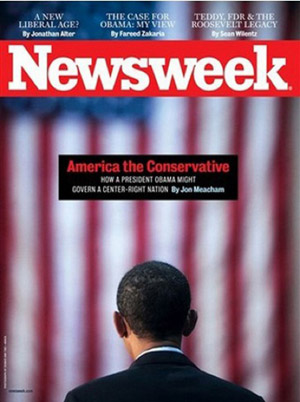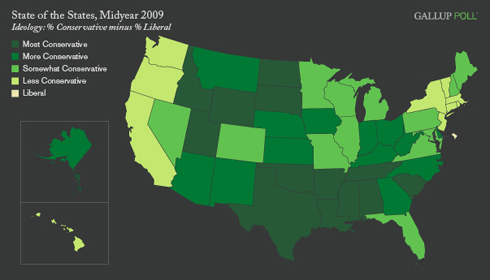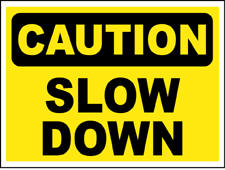 On the eve of the election last fall, Editor Jon Meacham wrote a cover story for Newsweek titled “America the Conservative — How a President Obama Might Govern a Center-Right Nation.” Predictably, he caught a lot of partisan grief for it, with one commentator calling him “conservative dittohead Jon Meacham” — an odd comment about the editor of one of America’s most resolutely pro-Obama publications.
On the eve of the election last fall, Editor Jon Meacham wrote a cover story for Newsweek titled “America the Conservative — How a President Obama Might Govern a Center-Right Nation.” Predictably, he caught a lot of partisan grief for it, with one commentator calling him “conservative dittohead Jon Meacham” — an odd comment about the editor of one of America’s most resolutely pro-Obama publications.
The center-right label seemed right to me at the time, even though it was clear that Obama was about to win the election. Obama’s movement toward the right, both before and after the election, has been a recurring theme on this blog.
Now comes Gallup with a poll that seems to indicate that America is not just center-right as a whole, but pervasively throughout the country.
We all know that some states are more conservative than others, and the Gallup poll supports this. But the poll also found that self-identified conservatives outnumbered self-identified liberals in every single state. In three states (Hawaii, Vermont and Massachusetts), the conservative margin was small enough to be statistically insignificant — but only in the District of Columbia were liberals found to outnumber conservatives. The map below shows the relative conservative strength in each state, and as you’d expect, the most conservative states are clustered in the South and the non-coastal West.

How then does it occur that Democrats control not just the White House and both houses of Congress, but also a majority of the governorships and state legislatures?
Partly it reflects the fact that Republican does not equal conservative, and Democrat does not equal liberal. But I also think the poll results may be skewed because of a difference of acceptance level of the terms liberal and conservative.  I have no data to support this, but it seems like the word “liberal” has become tainted in the minds of many people in a way that “conservative” has not. Some liberals choose to call themselves “progressive” to avoid the taint, while there is no similarly popular synonym for conservative. If I’m right about this, people who are somewhat left of center would be more likely to call themselves “moderate,” while people the same distance to the right of center would be more willing to cop to being conservative.
Reeling this all back into the policy realm, I think this center-right orientation explains why Obama and the Democrats are having trouble selling health care “reform” — which, as Melissa Clothier points out, would more accurately be described as health care “transformation.”
The Democrats managed to ram through a porkulus bill that included hundreds of billions dollars of non-stimulative long-term spending on Democratic priorities because the country was perceived to be in an economic crisis — something had to be done now now now now now. Certainly some people across the spectrum were concerned about committing to so much spending, but hey, deficit spending is just politics as usual.
The proposed health care transformation is different. Certainly our health care system is not perfect, but most Americans see that it functions pretty well in their personal experience, however much they may grumble about costs. Despite Obama’s disingenuous talk about having the insurance companies “compete” with a “public option” backed by the vast resources and regulatory clout of the government, most people recognize that no such competition is sustainable.
With a public option, the corporations who currently fund health insurance for their employees will have two choices — they can continue to negotiate with insurance companies to try to get the best deal for themselves and their employees, or they can get out of the middle, stop bothering with insurance companies and just dump all their employees into the public “option.” Hmmm… decisions, decisions.
 People intuitively understand that the “public option” is a first step toward a single-payer world in which the government directly controls one-sixth of the economy, and has no competitive incentive to reduce costs and improve service. Some on the Right refer to this as “postalizing health care,” although that’s not really fair. Thanks to Fedex, UPS, email and the telephone, the post office has a lot more competition than a single-payer health care system would have.
People intuitively understand that the “public option” is a first step toward a single-payer world in which the government directly controls one-sixth of the economy, and has no competitive incentive to reduce costs and improve service. Some on the Right refer to this as “postalizing health care,” although that’s not really fair. Thanks to Fedex, UPS, email and the telephone, the post office has a lot more competition than a single-payer health care system would have.
Maybe single-payer is the way to go. I don’t think so, but let’s have that debate. But let’s stop pretending that it’s not the direction the Left intends to head.
Leave a Reply